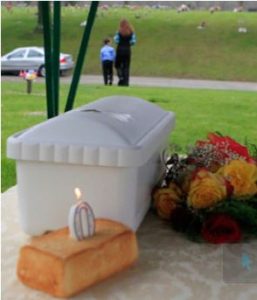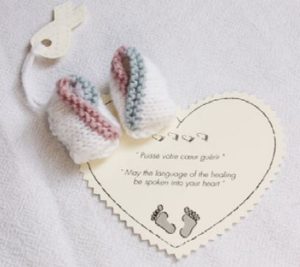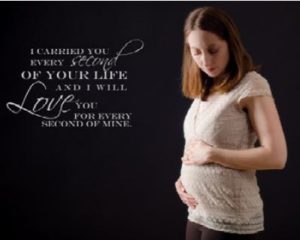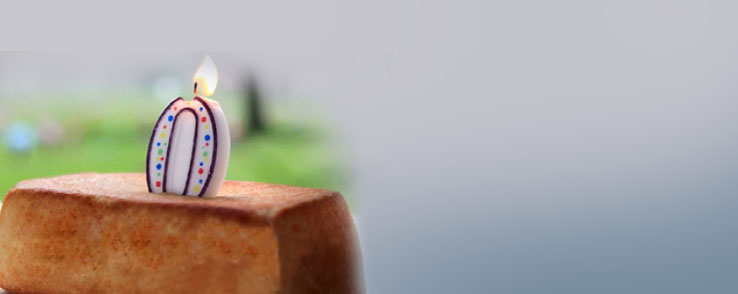In the dark, confusing times following the loss of a baby in pregnancy, birth, or after a neonatal complication, counselor/
author, Heidi Faith, offers a light of hope to grieving mothers through her organization, Stillbirthday. Impassioned by her own experience of loss and grief, Heidi founded Stillbirthday in 2011 as a network of doulas, chaplains, and other volunteers. It has grown to reach more women than Heidi could have imagined. The network members are dedicated to serve the grieving family, regardless of circumstances surrounding the loss of their babies. They answer each call with a simple mantra, “I will hold your hand, and we will go on this journey together.”
Stillbirthday.com is a comprehensive wealth of information about pregnancy loss, in any trimester, thoughtfully designed to gently guide its visitors without overwhelming them. On the main page, under the sub heading, “Start here,” a visitor to the website sees this opening statement.
“If you are miscarrying right now, or have just found out that when your pregnancy is over your baby will likely not survive, this website is the right
place for you.”
“I am so very sorry.”
In a simple, profound and distinctly inclusive way, Heidi greets the visitor and acknowledges their loss and pain. From that point, the visitor to Stillbirthday discovers resources for their place in the loss experience. The links are carefully designed to minimize the trauma of “too much information” while still allowing women to find the support they need, practical or spiritual.
Moxie Voice has the distinct pleasure to speak to visionary, Heidi Faith, about her passion to support and honor the bereavement of mothers and their family through Stillbirthday.com.
Heidi, could please tell us a little about yourself?
Giving birth to my first child was such a transformative time in my life. A passion and a calling came together drawing me to become a doula (trained birth-support person). I wanted to serve families tangibly, while also offering them a spiritual connection in those earliest moments. For
over ten years, I felt like this was my path.
However, when I gave birth to my baby not alive, I felt like everything that I knew went out the window. It didn’t apply. It was no longer adequate. Even as an experienced doula, I didn’t know what to expect, what to do, how to feel, or what options I had. Every moment felt so overwhelming.
As the weeks went by, I felt increasingly compelled to offer or create some support for another mother facing this kind of unique grief. I just wanted to reach out and hold her hand. Three months later, I began Stillbirthday. It seemed to resonate with people it reached. Families felt like someone was there to hold their hand. It has grown beyond an on-line resource to include referrals, events, a local MOM shop, and training for others committed to serving women through StillBirthday Doula certification.
How does Stillbirthday serve families?
My hope is that we catch families in the earliest moments because those hold the opportunity for biggest and darkest chasms that families can to slip into. When your baby is born not alive the story doesn’t end. In fact in some ways, a whole new chapter is beginning.
For the rest of your life, you will always be a mother to a child, not alive.
We offer a token, a bit of manna, physical presence, a word of encouragement, a shoulder to cry on as we walk alongside them throughout their journey. However long it takes, we will walk with a mother as she integrates this into her motherhood story in a way that has dignity and supports healing. Each woman needs the time to mature and develop within her grief in a way that is unique to our own motherhood story.
How important is taking time to mourn?
Our culture says we can microwave a dish and call it dinner. We can microwave our friendships. Twitter binds us to 180 characters or less, and that supposed to be a conversation. Our culture is so fast paced, so moving forward, that we look at everything that way, especially grief. We don’t give ourselves the time to sit with it and understand it. We think it is dark, weird, scary, and gross. It is dark. It is scary. It can be weird. It can be gross. And it is absolutely beautiful, sacred, and holy because of all those things. The richness of healing occurs when we allow ourselves to enter in to that, with love and support guiding us through it.
Your organization helps families plan farewell celebrations. Could you explain what this is?
“Our culture is so fast paced,
so moving forward, that we
look at everything that way,
especially grief.”
 A farewell celebration is a way for parents and loved ones to engage in a very tangible ceremony or activity to mark the end of the labor, birth, delivery, aspect of their story. Having a farewell celebration is in no way saying, “My baby was buried, and now I have to entirely discipline my grief, box it away and hide it away.” This farewell ceremony is meant to be that threshold into that long term journey with your grief. If a family never had a farewell with the physical form of their baby, we help them find ways to represent which may be personally symbolic, for example, creating a garden or releasing balloons.
A farewell celebration is a way for parents and loved ones to engage in a very tangible ceremony or activity to mark the end of the labor, birth, delivery, aspect of their story. Having a farewell celebration is in no way saying, “My baby was buried, and now I have to entirely discipline my grief, box it away and hide it away.” This farewell ceremony is meant to be that threshold into that long term journey with your grief. If a family never had a farewell with the physical form of their baby, we help them find ways to represent which may be personally symbolic, for example, creating a garden or releasing balloons.
We seek to give the mother choices in coping, a sense of control. To help her discover, in her own time, and in her own way, that she can decide when she is going to release. We have found there is power and healing in processes and rituals to honor a loss that feels unrecognized
or under-recognized.
Stillbirthday also provides families with another symbolic outlet to acknowledge their lost babies.
We at Stillbirthday also give families an opportunity to participate in our “Hearts Release.” Every day, families can find Stillbirthday.com and enter their baby’s name on the site. This can be a very powerful act, in itself, to type out your baby’s name. I maintain the list of names for all visitors to see or add to. I also print those lists and personally hand scribe each name onto tiny, seeded floral hearts. Packets of these hearts are distributed to mothers attending our Love Wildly events. Attendee mothers then lovingly plant the seeds in a powerful symbolic gesture. We value these women’s stories in tiny way, and release the hearts with dignity and love.
What are some barriers to healing that women encounter?
 There are lots of walls around pregnancy and infant loss. These walls can serve to heal and protect a mother, but shame will use them against you. Shame will creep into every bereavement story. I promise it will. It will enter into your story in a way that seems to be very specific and isolating. What shame will say, “Here is this wall. I’m going to box you up, lock this door, suffocate you and make feel all alone. You are totally weird, different and you don’t have the worthiness to open up the window to take in a breath of fresh air. You are not worthy of love.”
There are lots of walls around pregnancy and infant loss. These walls can serve to heal and protect a mother, but shame will use them against you. Shame will creep into every bereavement story. I promise it will. It will enter into your story in a way that seems to be very specific and isolating. What shame will say, “Here is this wall. I’m going to box you up, lock this door, suffocate you and make feel all alone. You are totally weird, different and you don’t have the worthiness to open up the window to take in a breath of fresh air. You are not worthy of love.”
If a woman’s bereavement is not nurtured and met with love in those earliest moments, that darkness, that chasm, becomes fertile ground for shame to wreak havoc. For example, a woman might say, “I had a miscarriage, but back when I was sixteen I thought about having an elective
abortion, so maybe, because I thought about having one, maybe God took my baby away to punish me.” Another mom might say, “My baby was born at thirty-nine weeks, and I pumped gasoline the day before. I breathed in the fumes and I caused my baby’s death.” There is a critical time for newly bereaved mothers in which loving support and acceptance and help set a course for healthy grieving.
“Shame will make you feel like you’re not supposed to share your story, you are not supposed to heal. Shame is such a liar! Shame will creep into every bereavement story. I promise it will.”
How do you help the grieving mothers with their sense of shame?
The concept of one of our events, Loved Wildly, is to defy shame, to call it out! Our intention is to help women get to a place where they can say, “I’m going to tell the world that not only is my story valuable, but shame has been trying to lock me in. My shame told me that I cannot open that window and gasp for air.”
“I’m going to open up that window gasping for air and shout at the top of my lungs that shamehas been trying to trap me!” We will bear witness to that woman’s voice saying, “I am a bereaved mother, and shame has scripted this story that makes total sense, but I’m going to love myself
anyway. I am going to dare that I am worthy. I’m going to love myself wildly, messily. I’m going to love my wounded heart, even if it doesn’t make sense.”
As a part of the event, women make a commitment to that! They do their hair, dress up to the nines, and make a vow to heal, to love. A promise to themselves that states, “I’m going to love you and be a witness to your whole life story. You are going to be remembered and that you
matter.” We need to do that for ourselves, especially after the trauma of loss.
“We don’t give ourselves the time to sit
with our grief and understand it.”
Many of our readers at Moxie Voice come to our website because they are facing overwhelming
darkness. What would you say to encourage them?
If I could offer any piece of advice to any hurting person, of any story, I would say, “Go slow. Go gently.” Because our culture is so fast-paced. We tend to respond to hard things quickly. That is where we have a lot of impulsive attempts at fixing hard things, and feel shame when we cannot
find a “quick fix.”

 “Going slow looks different to each person. It means daring to reach out, and believing that you are not alone. Believe that you are worthy to receive authentic love.”
“Going slow looks different to each person. It means daring to reach out, and believing that you are not alone. Believe that you are worthy to receive authentic love.”




